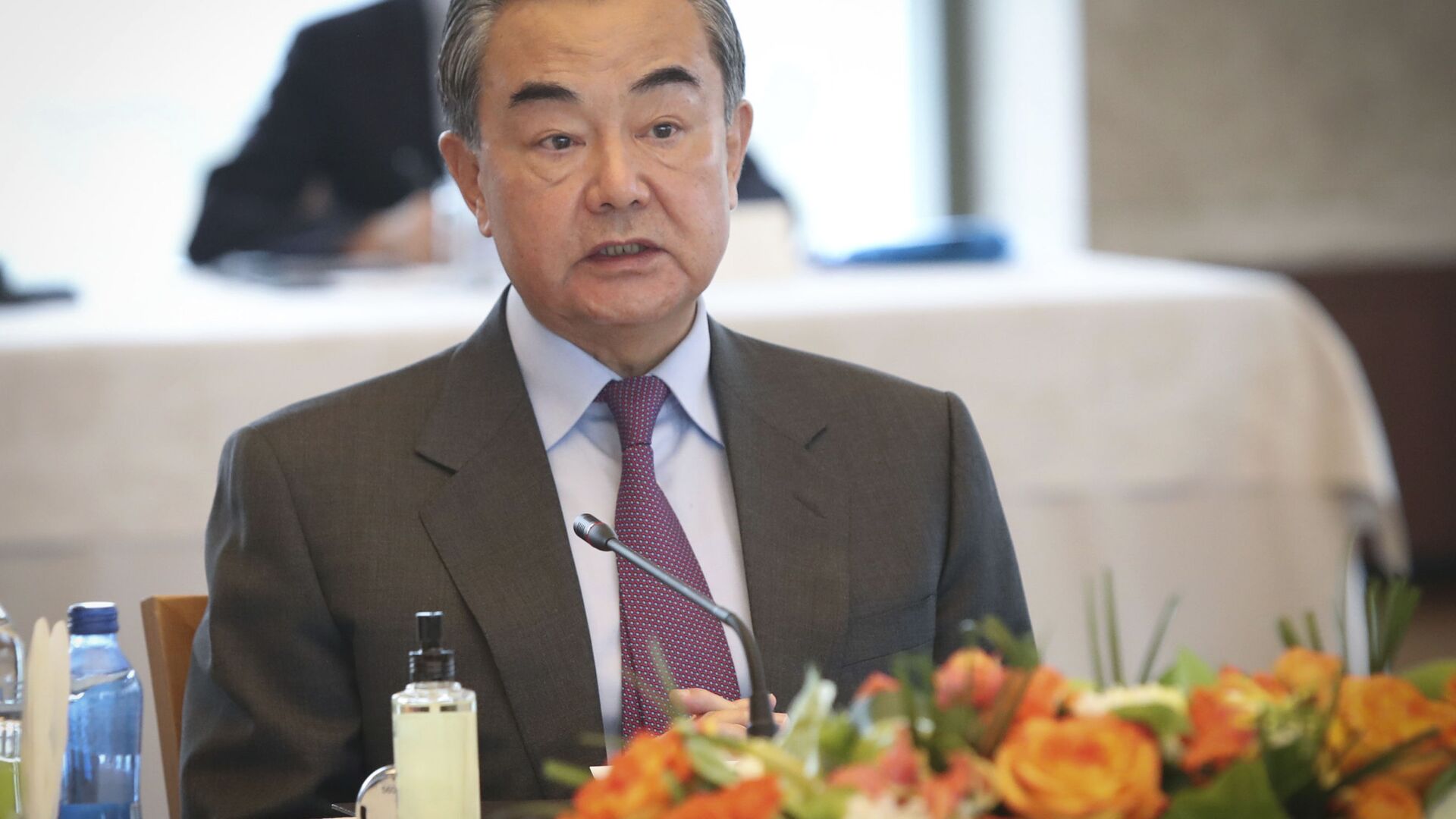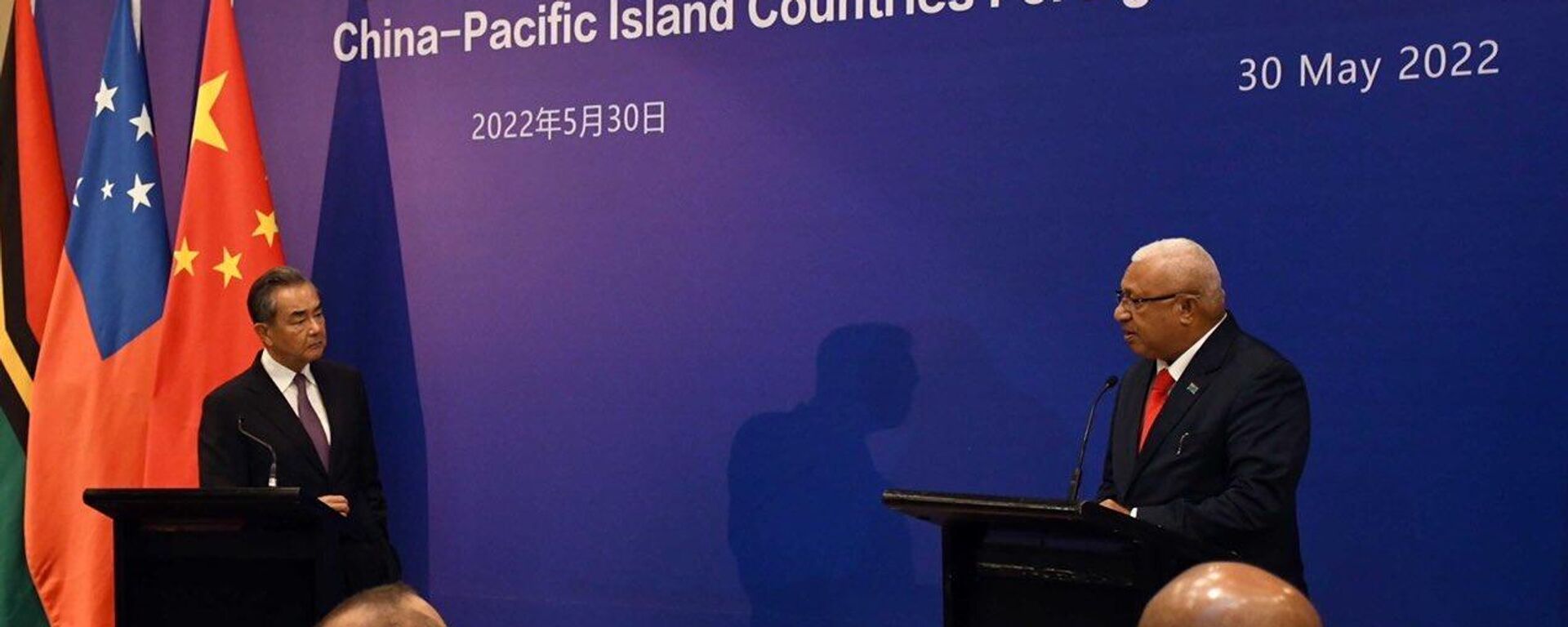https://sputnikglobe.com/20220606/china-willing-to-cooperate-with-australia-and-new-zealand-in-pacific-region-wang-yi-says-1096057023.html
China Willing to 'Cooperate' With Australia and New Zealand in Pacific Region, Wang Yi Says
China Willing to 'Cooperate' With Australia and New Zealand in Pacific Region, Wang Yi Says
Sputnik International
China’s growing influence in the Pacific Island region has been eyed with suspicion by Australia and New Zealand. China has urged both nations to view... 06.06.2022, Sputnik International
2022-06-06T13:55+0000
2022-06-06T13:55+0000
2022-10-19T18:35+0000
china
australia
new zealand
pacific islands
us
wang yi
asia
https://cdn1.img.sputnikglobe.com/img/07e5/08/14/1083665927_0:270:2680:1778_1920x0_80_0_0_c0845dae9679cbd1b03f3ab5bea93953.jpg
Chinese Foreign Minister Wang Yi has said that Beijing is ready to “cooperate” with Australia and New Zealand in carrying out “trilateral” and “quadrilateral“ projects in the Pacific Island Countries (PICs). Thus, China is extending an olive branch to the dominant regional powers and Washington's treaty allies in the region.Wang remarked that Beijing “respects the traditional links” that the Pacific nations have established with Australia and New Zealand, two of the bigger powers of the region.Wang recalled that Beijing has, in the past, carried out some developmental projects in partnership with Canberra and Wellington.The remarks by Wang came after he concluded his keenly-watched eight-nation visit between 26 May and 4 June to the southern Pacific countries—the Solomon Islands, Kiribati, Samoa, Fiji, Tonga, Vanuatu, and Papua New Guinea, as well as Timor-Leste.On 30 May, Wang also co-chaired the second China-Pacific Island Countries Foreign Ministers’ Meeting in Fiji’s capital Suva, which was also attended by representatives from Kiribati, Samoa, Niue, Papua New Guinea, Vanuatu, Micronesia, the Solomon Islands, and Tonga.A 15-point ‘position paper’ released by Beijing during Wang’s multi-country tour stated that Beijing was “committed to deepen its comprehensive strategic partnership” with the Pacific Island nations. The official Chinese foreign policy document called for promoting “regional peace and security”, besides calling for working together to “combat transnational crime including cyber-crime, and jointly tackle non-traditional security threats”.China’s Security Presence a ‘National Security Concern’, US and New Zealand SayBeijing unveiled its ‘position paper’ after a proposed “region-wide deal” between China and the Pacific nations couldn’t be cleared at the 30 May meeting owing to concerns expressed by some island states. Some of them cautioned that the pact could lead to a ‘Cold War’ between Beijing and the US, the pre-eminent power in the Pacific since the Cold War.As per Reuters, the proposed pact has clauses on policing, security and data communication. Beijing’s envoy to Fiji has said that “further discussions” would be held on the agreement.The proposed pact also raised hackles in the US, Australia and New Zealand, with all three nations already alarmed by the formal unveiling of the security cooperation agreement between China and the Solomon Islands in April.The US State Department warned at a briefing last month that the proposed pact could “fuel international tensions”.Meanwhile, a joint statement released after the meeting between New Zealand’s Prime Minister Jacinda Ardern and US President Joe Biden at the White House on 1 June expressed concern over the “growing strategic competition in the Pacific region”.“...we note with concern the security agreement between the People’s Republic of China and Solomon Islands. In particular, the United States and New Zealand share a concern that the establishment of a persistent military presence in the Pacific by a state that does not share our values or security interests would fundamentally alter the strategic balance of the region and pose national-security concerns to both our countries,” the joint statement said.On the part of Australia, the new government under Prime Minister Anthony Albanese, which came to power last month, has stepped up Canberra’s diplomatic engagements in the Pacific nation, besides boosting its development package to the region by nearly half a billion dollars.Albanese has blamed the deepening security ties between Beijing and Solomon Islands on “funding cuts” in assistance to Pacific nations by Canberra’s outgoing government headed by Scott Morrison.During her first visit as new foreign minister on 26 May, Australia’s Penny Wong told the Fijian leadership that Canberra was “determined to make up for a lost decade on climate action”. The Pacific Island nations have collectively described climate change as the “single greatest threat to the livelihoods, security and well-being of the peoples” in the region.Albanese said at the Quad Leaders’ meeting in Tokyo on 24 May, a day after being sworn in as the country’s new leader, that his government would “bring more energy and resources to securing the region" as it enters "a new and more complex phase in the Pacific's strategic environment”, a reference to Beijing’s growing presence in the region.Beijing, on the other hand, has accused the US of being the “real threat” in the Asia-Pacific region.
https://sputnikglobe.com/20220531/china-releases-paper-clarifying-goals-of-new-pacific-regional-pact-amid-us-fear-mongering-1095889287.html
china
australia
new zealand
Sputnik International
feedback@sputniknews.com
+74956456601
MIA „Rossiya Segodnya“
2022
News
en_EN
Sputnik International
feedback@sputniknews.com
+74956456601
MIA „Rossiya Segodnya“
Sputnik International
feedback@sputniknews.com
+74956456601
MIA „Rossiya Segodnya“
china, australia, new zealand, pacific islands, us, wang yi
china, australia, new zealand, pacific islands, us, wang yi
China Willing to 'Cooperate' With Australia and New Zealand in Pacific Region, Wang Yi Says
13:55 GMT 06.06.2022 (Updated: 18:35 GMT 19.10.2022) China’s growing influence in the Pacific Island region has been eyed with suspicion by Australia and New Zealand. China has urged both nations to view Beijing’s growing international footprint as an “opportunity. Beijing has also urged New Zealand to uphold its "independent foreign policy"; i.e. one disentangled from that of the US.
Chinese Foreign Minister Wang Yi has said that Beijing is ready to “cooperate” with Australia and New Zealand in carrying out “trilateral” and “quadrilateral“ projects in the Pacific Island Countries (PICs).
Thus, China is extending an olive branch to the dominant regional powers and Washington's treaty allies in the region.
“We have no intention of competing with anyone for any influence, nor are we interested in engaging in any geopolitical competition,” Wang said in an interview to the state media. A transcript of Wang’s remarks was published on the Chinese Foreign Ministry’s website on Monday.
Wang remarked that Beijing “respects the traditional links” that the Pacific nations have established with Australia and New Zealand, two of the bigger powers of the region.
“China will continue to adopt an open attitude and carry out more trilateral or quadrilateral cooperation with Australia and New Zealand in the South Pacific region, according to the wishes of Pacific Island countries to leverage our respective strengths and form greater synergy,” the top Chinese diplomat stated.
Wang recalled that Beijing has, in the past, carried out some developmental projects in partnership with Canberra and Wellington.
The remarks by Wang came after he concluded his
keenly-watched eight-nation visit between 26 May and 4 June to the southern Pacific countries—the Solomon Islands, Kiribati, Samoa, Fiji, Tonga, Vanuatu, and Papua New Guinea, as well as Timor-Leste.
On 30 May, Wang also co-chaired the second China-Pacific Island Countries Foreign Ministers’ Meeting in Fiji’s capital Suva, which was also attended by representatives from Kiribati, Samoa, Niue, Papua New Guinea, Vanuatu, Micronesia, the Solomon Islands, and Tonga.
A
15-point ‘position paper’ released by Beijing during Wang’s multi-country tour stated that Beijing was “committed to deepen its comprehensive strategic partnership” with the Pacific Island nations.
The official Chinese foreign policy document called for promoting “regional peace and security”, besides calling for working together to “combat transnational crime including cyber-crime, and jointly tackle non-traditional security threats”.
China’s Security Presence a ‘National Security Concern’, US and New Zealand Say
Beijing unveiled its ‘position paper’ after a proposed “region-wide deal” between China and the Pacific nations couldn’t be cleared at the 30 May meeting owing to concerns expressed by some island states. Some of them cautioned that the pact could lead to a ‘Cold War’ between Beijing and the US, the pre-eminent power in the Pacific since the Cold War.
As per Reuters, the proposed pact has clauses on policing, security and data communication. Beijing’s envoy to Fiji has said that “further discussions” would be held on the agreement.
The proposed pact also raised hackles in the US, Australia and New Zealand, with all three nations already alarmed by the formal unveiling of the security cooperation agreement between China and the Solomon Islands in April.
The US State Department warned at a briefing last month that the proposed pact could “
fuel international tensions”.
Meanwhile, a joint statement released after the meeting between New Zealand’s Prime Minister Jacinda Ardern and US President Joe Biden at the White House on 1 June expressed concern over the “growing strategic competition in the Pacific region”.
“...we note with concern the security agreement between the People’s Republic of China and Solomon Islands. In particular, the United States and New Zealand share a concern that the establishment of a persistent military presence in the Pacific by a state that does not share our values or security interests would fundamentally alter the strategic balance of the region and pose national-security concerns to both our countries,” the joint statement said.
On the part of Australia, the new government under Prime Minister Anthony Albanese, which came to power last month, has stepped up Canberra’s diplomatic engagements in the Pacific nation, besides boosting its development package to the region by nearly half a billion dollars.
Albanese has blamed the deepening security ties between Beijing and Solomon Islands on “funding cuts” in assistance to Pacific nations by Canberra’s outgoing government headed by Scott Morrison.
During her first visit as new foreign minister on 26 May, Australia’s Penny Wong told the Fijian leadership that Canberra was “determined to make up for a lost decade on climate action”.
The Pacific Island nations have collectively described climate change as the “single greatest threat to the livelihoods, security and well-being of the peoples” in the region.
Albanese said at the
Quad Leaders’ meeting in Tokyo on 24 May, a day after being sworn in as the country’s new leader, that his government would “bring more energy and resources to securing the region" as it enters "a new and more complex phase in the Pacific's strategic environment”, a reference to Beijing’s growing presence in the region.
Beijing, on the other hand, has accused the US of being the “real threat” in the Asia-Pacific region.
“The US has military bases all over the world, yet it expresses concerns about normal security cooperation with other countries. Such an act is hypocritical and reflects the US' deep-rooted hegemonic mentality. The real security threat is that the US has cobbled together military blocs in the region, stimulated an arms race and brought nuclear proliferation risks to the South Pacific,” Chinese foreign ministry spokesperson Zhao Lijian said while reacting to the Ardern-Biden meeting.



